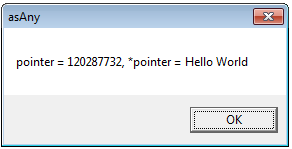dll.c
This is the c source for the DLL. It has one function (or entry point): asAny. The function takes one argument: a simple pointer (void*).
The function returns false if the pointer was a null pointer and true (or more exactly -1 which seems to be the VBA equivalent for true) otherwise.
Additionally, when the pointer was not null, it is assumed to be a pointer to a wstr (or an OLECHAR (?)). A message box then prints the address that the pointer points at as well as the string value at that address.
#include <windows.h>
__declspec(dllexport) int __stdcall asAny(void* pointer) {
char buf[200];
if (! pointer) {
// return 0 (false) to indicate that pointer was a null pointer
return 0;
}
wsprintfA(buf, "pointer = %p, *pointer = %s", pointer, (wchar_t*) pointer);
MessageBoxA(0, buf, "asAny", 0);
// return -1 (true) to indicate that ptrFoo was not a null pointer
return -1;
}
call-the-dll.bas
This is the source code that calls the DLL.
The argument pointer of the DLL function asAny is declared with the special type any that seems to be necessary in order to be able to pass null pointers.
option explicit
declare ptrSafe function asAny _
lib "the.dll" ( _
byVal pointer as any _
) as boolean
sub main()
if asAny( nothing ) then
debug.print("asAny( nothing ) returned true" )
else
debug.print("asAny( nothing ) returned false")
end if
' --------------------------------------------------------
' if asAny( 0 ) then --> Compilie error: Type mismatch
' --------------------------------------------------------
if asAny( vbNullString ) then
debug.print("asAny( vbNullString ) returned true" )
else
debug.print("asAny( vbNullString ) returned false")
end if
' --------------------------------------------------------
dim text as string
text = "Hello World"
if asAny( text ) then
debug.print("asAny( text ) returned true" )
else
debug.print("asAny( text ) returned false")
end if
end sub
Output
The VBA program calls asAny three times.
The first time, it calls it with
nothing. This is passed as
null pointer to the DLL and consequently, the DLL returns false.
The second time, the function is called with the special constant vbNullString. Also this value is passed as null pointer to the DLL and again, the function return false.
In the third time, the function is called with a
string. This is passed as an actual pointer. Hence, the DLL displays a message box and returns true.
